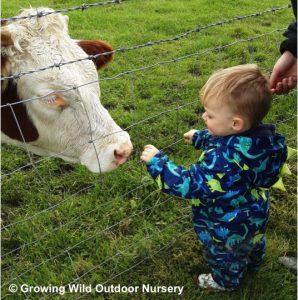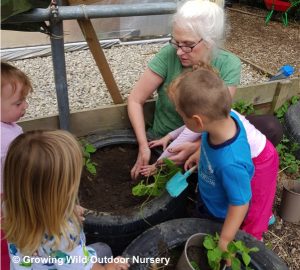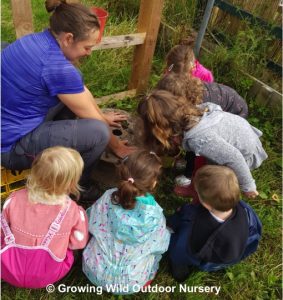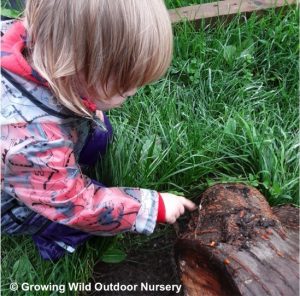A few months ago, in April 2021, Janet Packer and Lindsey Bielby shared some of their vision for Growing Wild Outdoor Nursery at an online meeting hosted by Sheffield branch of Early Education. I was struck by how they framed their approach in practice, towards their core values of wellbeing and sustainability, as a sustainability frame of mind: not ‘teaching’ or ‘doing’ sustainability, but seeding, growing and nurturing a world-view and approach to life of awareness, compassion and responsibility. This is much deeper work that infiltrates all intentions and experiences, embedding a way of living in and with the world during children’s time at nursery, which can also carry forward through life.
‘Ecological identity and education for sustainability’ is a central aspiration and strand of work for Early Childhood Outdoors:
Nature’s responsiveness to the play drives of the child helps build the attachment to nature that in turn creates an ‘ecological identity’ – a deep identification with nature as part of the growing sense of self. When children intuitively know that they are part of nature and it is part of them, with little sense of separation from it, they feel at home in the outdoors, are able to be nurtured by nature, and experience a need to care for and protect it throughout their lives.
A key driver of the Early Childhood Outdoors meshwork’s work is to increase young children’s contact and interaction with the every day nature around them, deepening their relationship with both the physical and living natural world. Through a range of support and collaborations, we’ll research ecological identity and education for sustainable development, raise awareness and share action, working to foreground and embed these important ideas in practice across the UK.
It is really important for us to work out what ‘education for sustainable development’ means for very young children and Early Childhood Care & Education, and what this can actually look like in practice that is effective. As an ECO Pioneering Centre, the team at Growing Wild is both exploring this and pushing the boundaries in working with the outdoors towards this purpose.
So, I’m very pleased to kick start an ECO blog focus over the coming months on this critically important theme with the first of two linked posts from Janet: in the next one she will share some of the practices and ways of being they are developing. We’ll also be hearing from Louise Lloyd-Evans of Young Friends Nature Nursery and founder of SNAP – do keep a look out for all of these!

Sustainability mindset – challenging the norm and raising questions on pedagogy and practice by Janet Packer
The past eighteen months has been a difficult time for us all. However, it has also been an opportunity to reflect, to learn and to look for silver linings. It has brought to the forefront issues such as mental health, wellbeing and social interaction, as well as broader but interrelated challenges, such as sustainability and climate change.
This post will explore the ethos, vision and values of Growing Wild Outdoor Nursery, a fully outdoors setting, and how we are integrating a sustainability mindset in our pedagogy and practice. Our focus is on wellbeing with regard to children’s connections and interactions in the natural outdoor environment. We set up on a minimal budget – resources were made, donated, upcycled, recycled – with sustainability in mind. We have fifty children on role, thirty each day and twelve staff from a variety of professional backgrounds, bringing a wealth of skills, knowledge and experience. Our ethos is to give children the time, space and freedom to learn naturally and enjoy the outdoors. Our vision – to create a safe and stimulating environment where adults inspire and enable children to be healthy, happy and capable individuals, who care for each other and their world, now and in the future.

The first eighteen months at Growing Wild has been a rollercoaster ride. We opened in October 2019 and closed for three months as we went into lockdown in March 2020. This gave us time to reflect on our first six months, build relationships with our families through a closed social media group, and spend time meeting (virtually) with staff and focusing in on CPD. By the end of September, our numbers had tripled as parents told us they wanted their children to be outdoors. This time for reflections made us consider whether the pandemic could be an opportunity for wider reflection and action, on issues such as mental health, wellbeing and sustainability.
The evidence in early childhood education on how and what we learn from being outdoors has been gaining traction in the last decade and can be seen further back in early childhood education in the work of Frobel, Steiner and Macmillan. The pandemic has brought this to the fore and accelerated the urgency of centring our relationships with the environment as a matter of critical concern, in terms of sustainability but also with regards health and wellbeing, and one that needs to be addressed in curricula from the start. The past eighteen months has also highlighted some crucial global issues, as nature is pushed to breaking point with effects on climate change, biodiversity loss and the global pandemic itself.

It is therefore crucial that we recognise the relationship between climate and health and the fundamental relationships between humans and the natural world (James and Chakraborty, 2020). Sustainability should not be seen as curriculum, practice or policy, but as a ‘frame of mind’ that supports the decisions we make about the way we live our lives, and laying the foundations for this ‘sustainability frame of mind’ created by childhood experiences in nature has specific advantages. When children are treated as competent and capable learners with emerging interests to be supported through positive and meaningful pedagogies, then local and possibly global understandings can emerge. The sense of place and agency that nature play provides creates real experiences and opportunities for children to calculate risks and engage with challenges, thus paving the way for the bigger decisions encountered in adulthood.
In an opinion piece in the British Medical Journal (January 2021), policy-makers were urged to recognise the importance of education to social and mental health outcomes alongside an appropriate focus on employment and economic prospects. The article argued that children are the living message we send to a time we will not see, and that we urgently need to improve our efforts to meet their needs, ensuring that this generation is not disproportionately disadvantaged by Covid-19.

At Growing Wild we hope to challenge the norms of the curriculum and create a ‘sustainability frame of mind’ through our pedagogy and practice, by focusing on the relationships between nature and health/wellbeing that starts in children’s earliest years.
“For the child … it is not half so important to know as to feel. If facts are the seeds that later produce knowledge and wisdom, then the emotions and the impressions of the senses are the fertile soil in which the seeds must grow.” (Carson in Hayward, 2012, p1)
References
Hayward, B. (2012), Children, Citizenship and Environment: Nurturing a democratic imagination in a changing world, Routledge
James, C., and Chakraborty, S., COVID-19 is a precursor for infectious disease outbreaks on a warming planet, https://thehill.com/opinion/healthcare/534562-covid-19-is-a-precursor-for-infectious-disease-outbreaks-on-a-warming, accessed 22/01/2021

See previous posts about Growing Wild Outdoor Nursery here:
Vegetable patch to Ofsted registration in 4 months! October 2019
Sliver linings May 2020
Opening up the outdoors after lockdown July 2020
Images are all copyright Janet Packer, Growing Wild Outdoor Nursery and must not be used without written permission from the photographer or Early Childhood Outdoors

